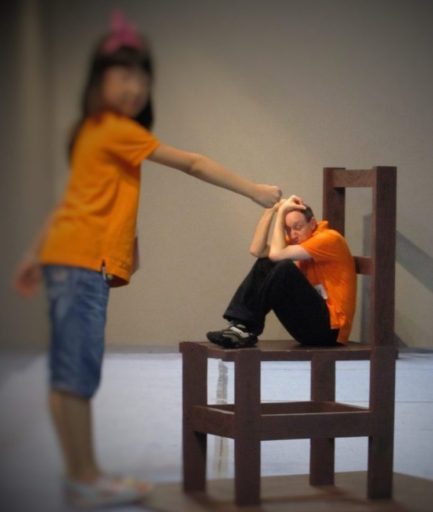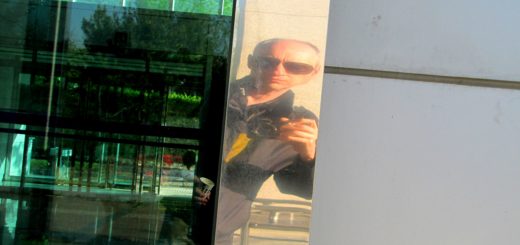Of Pop Tart Guns, Kafka, and Kindergarten
Almost exactly four years ago, I wrote an article for American Thinker, “Kindergarten and the Kafkaesque,” about the rash of suspensions being meted out to boys caught with toy guns, or even imaginary guns, at U.S. public schools. I somehow neglected to repost that piece here in Limbo, but thanks to a reader-friend, Lon, who raised the topic in an e-mail, I suddenly recognized my error, and will proceed to rectify it right now, with a few minor edits. The piece, as I’m sure you’ll find, is as relevant as ever, and will continue to be sadly relevant for the foreseeable future, which is to say until the world awakens from its sleep of reason and shatters the monstrous hegemony of public school.
Kindergarten and the Kafkaesque
To follow up on the story of a five year old boy suspended for showing a cap gun to his friend on a school bus, Investor’s Business Daily relates a charming collection of similar anecdotes regarding such child abuse at U.S. re-education camps — oops, I mean public schools. Each tale involves a very young child receiving severe punishment for the offense of imagining he had a gun.
In the most recent case in question, a kindergarten student in Maryland shows his cap gun to a friend, and is brow-beaten for two hours by school officials, without his mother even being notified, until he wets his pants in fear. In another case, a boy caught with “a quarter-sized Lego toy gun” on his school bus is threatened with suspension from the bus, detention, and the demand of a written apology to the bus driver. Perhaps my favorite story, however, were I a fan of surreal horror, would be that of the seven year old boy who bites a Pop Tart into the shape of a gun and then says “bang, bang,” for which threatening behavior he receives a two-day suspension.
Needless to say, not one of these cases involves an actual threat or danger to anyone. Nor do any of them even indicate malicious intent on the part of the “offending” child; these were just boys playing, having fun, showing off their toys, or goofing around in the lunch room. In other words, their punishment — any punishment — seems disproportionate compared to their alleged wrongdoing.
But that conclusion, though correct from the point of view of common sense, is too easy, and actually misses the point. This is where the lines of communication between ordinary humans and progressive authoritarians break down every time. For in the Kafkaesque world of progressive regulatory theocracy, there is no disproportion at all between these children’s offenses and their punishments, once you understand that the children were not being punished for threatening or endangering anyone. Rather, they were being punished for “referencing” firearms in a non-judgmental — or even (gasp) approving — manner. In other words, their offense, in each case, was, in adult terms, nothing less than a thought crime.
The boys’ harmless actions were unacceptable precisely because they were harmless. That is to say, in the current moral grammar of progressivism, it is an offense against society to think about guns without hating or fearing them — just as it is an offense to think about Western history without the Marxist context of systemic oppression, to think of female modesty without its radical feminist critique, or to think of wealth without simultaneously thinking of greed. Thus, just as with these other notions, entertaining the idea of guns in an innocuous way is indecent, immoral, and warrants one’s removal from the collective.
No one ever mistook a half-eaten Pop Tart for a weapon. And that is precisely why you are forbidden from saying “bang, bang” while wielding a half-eaten Pop Tart. If this still makes no sense to you, that is because you are not crazy. But try, for a moment, to put yourself into the twisted psyche of a progressive authoritarian, and ask yourself this question: What is the message being sent through such rules, and the lesson being taught through their enforcement?
First lesson: guns are bad — all guns, in any situation, regardless of who has them, or why. Even your gun is bad in your hands. The gun itself is inherently evil, and not to be trusted. And that means you are not to be trusted if you imagine that guns could ever be an innocuous or innocent toy. Having a gun, or even pretending to have a gun, makes you, ipso facto, a bad child. And the same, by implication, goes for your parents, your grandparents, or anyone else who has a gun, or wishes to have one.
As I have elsewhere explained in theoretical terms, the very nature and purpose of compulsory public education is to soften the minds of each new generation for the tyrannical “paradigm shift” to be put into practice once that generation becomes the voting public. Here is an all-too-perfect practical instantiation of my argument. No governing document, and no natural rights theory, will be any match for the majority opinion issuing from a generation raised according to the “all guns are evil” principle.
Second lesson: it is not just guns themselves that are bad; even the thought of guns is unacceptable. Fake guns, Lego guns, Pop Tart guns, finger guns — “guns” that no one could ever mistake for a real gun — are offensive. The psychological aim is clear: you will be punished for imagining guns, until the government (er, I mean your teacher) washes that evil image from your dirty mind forever. Learning how to use contraceptives in your bisexual experimentation is an integral part of the elementary school curriculum; smoking dope like President Obama is just good clean fun; but getting caught with the thought of a gun in your mind is a suspension offense, and the police may need to be called in.
The ultimate goal is not to punish such thoughts; punishment is merely the means. The real goal is to break the young soul to self-censorship and self-accusation regarding all thoughts related to personal efficacy, individual power, independence, and self-defense. A submissive citizen does not “cling” to his weapons. Therefore, future citizens must be taught that such “clinging” is a vice. Submission to the collective is the goal. Seen from that perspective, it is quite logical to try to make children self-conscious about how they eat their Pop Tarts, lest they appear to be “threatening” society. Notice, they are not actually threatening any person; their threat, being imaginary, is abstract. It is a threat to “other students” in the abstract, to the collective. The child is learning to feel guilty if he catches himself in possession of thoughts unacceptable to the state as such; that is, he is learning to submit.
Kafka’s world is our world. The nightmare logic of infinite bureaucratic authority which drives a man into admitting his own guilt without even understanding what he is accused of is the mechanism of public school indoctrination. And like Kafka’s Josef K., we are all, in the compulsory progressive public school, to learn how to self-accuse, to self-incriminate, to self-condemn. And then, at the end of our submissive life of democratic self-enslavement, socialized medicine will treat us to the ignominy of an ending worthy of Josef K. — “‘Like a dog!’ he said; it was as if the shame of it should outlive him.”
At a personal level, my initial reaction to these school horror stories is that I had better hurry up and finish the book I am writing about public education before I lose the stomach for it. [Since writing that, of course, the book has been completed, and as of today has been downloaded by readers in at least twenty-nine countries. Get yours now.] More broadly, however, I can’t help thinking that the old philosophical mindbender, “How do you know you are not dreaming right now?” is getting more difficult to answer all the time. Surely no waking reality ever looked like this.
(Originally published June 3rd, 2013)



